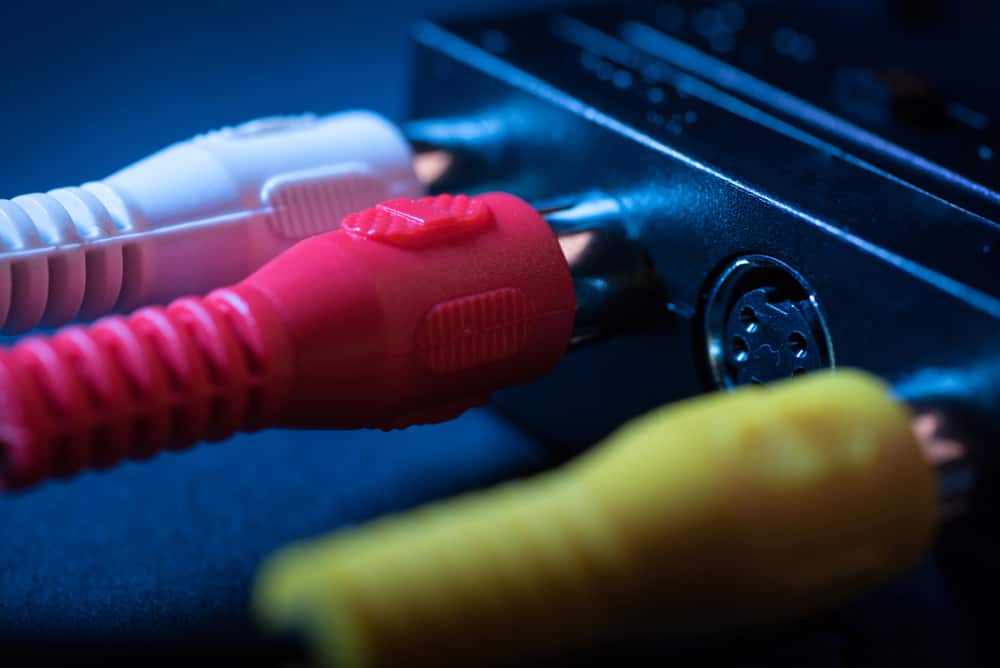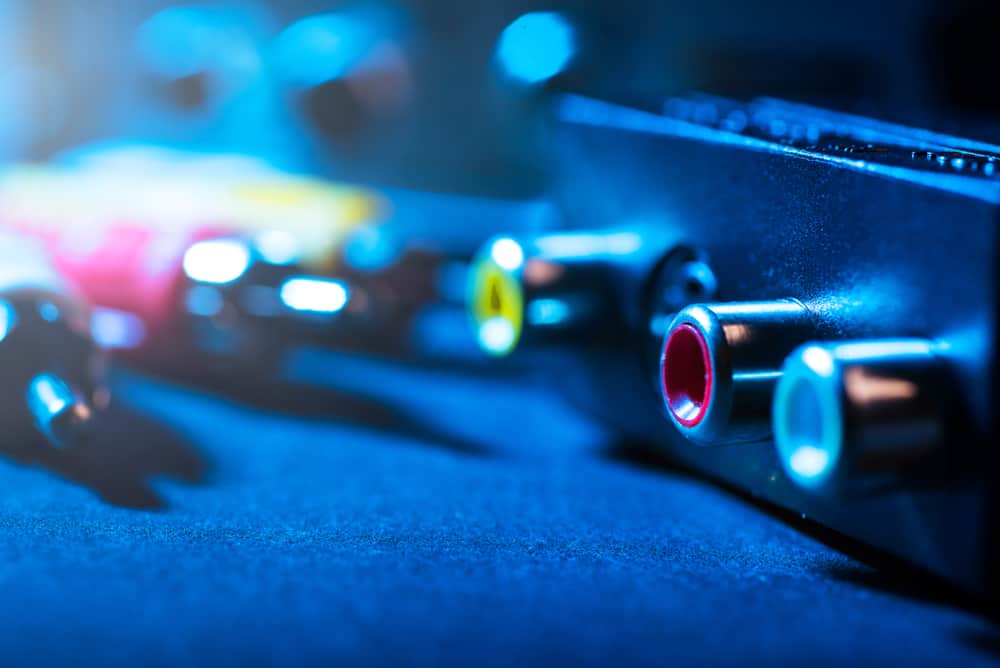
RCA cables have been around since the 1930s and many pieces of modern audio equipment still have RCA connections. So do RCA cables make a difference when compared to other cables that we now have access to and what are the problems they face?
RCA cables do make a difference due to them being high-level signal cables that are analog. Due to this, they are susceptible to noise and interference and the only way to overcome this is to use high-quality RCA cables, keep them short, and away from other audio equipment. Luckily they are not used for recording purposes but rather for playback of audio.
We’ll detail everything you possibly need to know about RCA cables and how they will impact your AV equipment or recording in your studio covering all the major aspects of them. We’ll even give you our best RCA cable pick if you are in the market and looking to purchase one.
What are RCA cables?
RCA cables are also known as phono connectors, are typically recognized by their yellow, red, and white colors. They are a form of electrical connector which is considered to be analog. The RCA name is taken from the Radio Corporation of America is a company that introduced the design back in the 1930s.
RCA cables, as well as sending audio signals, can send video signals via the yellow wire, but for purposes of this site and article, we will be disregarding the yellow connection, and we will focus on the red and white connection points.
What are RCA cables used for?
The connection types are primarily phono connection types, and this means mono to a degree. The red audio wire typically indicates the right audio channel, while the white wire is prompted to be the left audio channel. The audio signal that passes down each wire will not be stereo but once received at the source, the output may be blended to create a stereo mix.
What uses RCA cables?
RCA cables used to be the primary connection cable that all audio and video devices used from the 1930’2 up until the invention of USB, HDMI, Bluetooth, and optical cables. Most AV equipment still has RCA connection points because they have not completely been phased out due to the obscene number of devices and equipment that still use them to function.
For our purposes in the studio, everything from an amplifier to a CD player to a sound card can all have an RCA connection depending on how old your equipment is and how much you have paid for it. Typically most audio equipment will have an RCA connection point for backward compatibility of other devices, but this will mean you will have to pay more for it.
Do you record with RCA cables?
For the most part, you will not be using RCA cables to record. They are typically used to send the left and right audio channels of a mix to some equipment for playback purposes. This is the only saving grace of an RCA cable. You must remember that for recording purposes, you will, if not always, use a line jack cable (which is not ideal) or an XLR cable which is the best possible cable for recording.
If you want to know more about XLR and Jack cables, then check out my articles here, where I go over them in-depth, explaining everything you could possibly need to know about those two types of cables and how they are suited for recording purposes.
Do RCA cables make a difference in terms of performance?
We have to understand that RCA cables are designed on old technology, and because they are susceptible to lots of interference and noise, they are not the greatest quality audio cable. RCA cables, for this reason, are said to be high-level signals and, for some purposes, are not the greatest quality of cable you should be using in the studio. So in terms of this, they do make a difference but a bad difference.
Cables that are considered high-level signals are not great for audio in any circumstances, as we said, because of their susceptibility to noise and interference. Luckily, we discovered that they would not be used for recordings but rather to send the audio channels to a device allowing playback of the audio.
But even in this regard, if you are playing audio back from, let’s say, a turntable or a CD player, and you are connecting it up to the mixer or amplifier using RCA connections, the sound quality can be hindered.

What can cause problems with an RCA cable?
We discovered now that RCA cables would hinder performance in audio playback because they are considered high-level signal cables but let’s look further at the various situations that can cause an RCA cable to be more susceptible to noise and interference, creating a very unpleasant audio playback experience.
Gain can cause problems with an RCA cable
Gain is probably one of the factors that most people overlook, and this problem can occur even if you use high-quality cables made from expensive material. Due to the fact that when the gain is turned up, this creates more current that needs to flow through the cable, and because and RCA cable’s impedance is very low, it generates noise that the audio signal picks up and inevitably is heard through your speakers.
An easy way to test this is to plug in your RCA cables and then turn up the gain without playing any audio running through the cables, and you will hear a loud buzzing sound.
Cable length can cause problems with an RCA cable
You will find this problem also relating to Jack cables because they are also considered high-level signal cables (also known as hot cables or hot signals). When the length of a high-level cable (in our case, an RCA cable extends past a certain length, there is generally a certain amount of noise and interference you just can not get rid of. Due to this, it is best to keep your RCA cables short.
We will see below in the following headings that the quality of an RCA cable can also affect its performance.
Other equipment can cause problems with an RCA cable
If your RCA cable is not shielded and you have other audio equipment surrounding it, then the cable can pick up noise and interference. The best thing to do with all electronic equipment is to have it shielded (in essence, have it in a faraday case), but this is not always possible. Try to keep your RCA cables as far from any other electronic equipment as possible.
Other wires can cause problems with an RCA cable
As with other audio equipment, RCA cables can also pick up noise and interference from other cables running alongside it or across it, especially if both cables are high-level signal cables and have no shielding. Again, the best thing to do is run your RCA cables separately and out of the way of any other audio cables you may be using.
The quality of an RCA cable can cause problems
This plays a big part in the amount of noise and interference your RCA cable will be susceptible to. Some RCA cables made with quality material and shielding can have little to no noise or interference if managed correctly and can even run past a length of 100 feet. Lesser quality cables are always a no-no, especially if you are running a studio. The quality of your cables can make or break your recordings and your listening experience. Be sure always to use the best quality RCA cables you can.
Check out this RCA cable on Amazon.
Conclusion
We discovered that RCA cables do indeed make a difference when it comes to listening to audio. Although not specifically designed for recording, RCA cables are used on modern and old audio equipment to send the left and right mono audio signals, and you will most probably use them to link up AV equipment like turntables, mixers, amplifiers, and CD players.
RCA cables are analog and also high-level signal cables, and due to that, their performance is not so great because of the large degree to which they are susceptible to noise and interference. For the most part when you can choose to use a different form of input/output and then a different type of cable (XLR or digital) if you should always do so.

